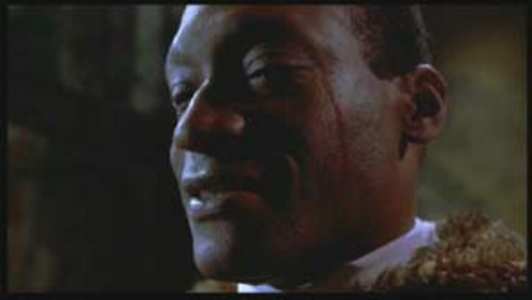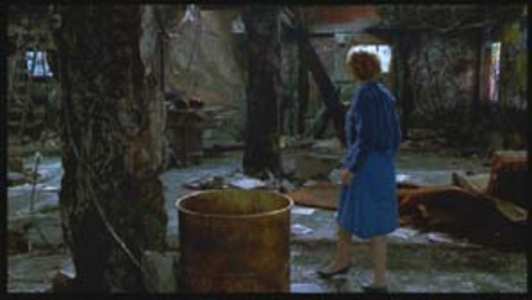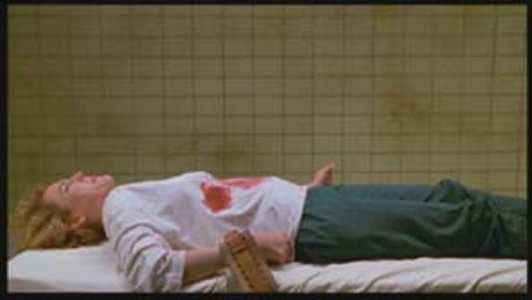Review of Candyman
Introduction
Candyman: “What’s blood for, if not for shedding?” During a tricky time for the primitive slasher pic (dark, imaginative, shrewd thriller ‘The Silence of the Lambs’ took the world by storm the year before), Bernard Rose’s adaptation of Clive Barker’s ‘The Forbidden’ is intelligent urban horror with a feminist spin.

Video
Somewhat scratchy transfer, but still mostly successful. The blood and gore come across gruesomely and the chilling atmosphere is well served.

Audio
Only a Dolby 2.0, but surprisingly ideal. The score is as clear as a bell and the dialogue and sonic shock tactics come across perfectly.

Features
A brilliant, eerily sinister menu, punctuated by floating animated captions and perfectly accompanied by Philip Glass’ startling minimalist score. Bizarrely, the effort that has been put into the menu screen does not translate to the extra features: A quite badly transferred 4:3 trailer, plus some barely adequate filmographies. Weak.

Conclusion
It starts off as successful as any horror film of the 90s. With a brilliantly sustained atmosphere of chilling premonition: Helen (Virginia Madsen) researching a University thesis on urban myths, stumbles upon the legend of Candyman (Tony Todd) a hook-handed killer who appears to his victims after they unwisely say his name five times in front of a mirror. Thus begins an obsessive quest, as Helen becomes wound up within the mythology of this elusive demon who may or may not be implicating her in his grisly crimes.
Rose equates the power of myth with the overwhelming power of poverty. The need for those consumed by economic destitution and social depravation to attribute their despair to mythical figures while the Bourgeois, here represented by Madsen, her slightly sleazy professor husband (Xander Berkeley) and his University cronies dismiss such notions as hokey superstitions. Here, the film provides a lethal undertow: Madsen can no longer deny the power of the myth to assume a devastating physical presence and thus she must accept that mythology doesn’t simply exist within the forgotten realm of America’s dismissed underclass. But that it is most powerful within the mysterious and inexplicable domain of reality. The film’s central theme, that mythological figures cannot exist without belief in the myths that precede them is vividly evoked.
Brilliant use of architecture: Bleak, stifling housing projects, the dwarfing elegance of the University Campus, the right-angled madness of the big city. With every location (except for, ironically, Candyman’s somewhat hackneyed insidious lair), Rose and his production team create an ominous maze of fear. The ghettos, like desolate urban dungeons, lie in the wake of overpowering Chicago skyscrapers that tower over like castles in the distance.
Plot wise, there are red herrings galore: Helen’s obsession, ghetto gang bangers, simple logic, Candyman himself doesn’t but in an appearance until half way through… does he even exist at all? Is he merely a creation of Helen’s to cover her own horrifying deeds? The film acutely creates a downward spiral of despair in the second act, helped along by strategically placed shocks and fortuitous use of gore. Rose indulges in some cheap tricks, but mostly stays subtle and spine-chilling. The film generally echoes Kubrick’s ‘The Shining’ more than ‘Friday the 13th’-esque slashers in visual and sonic composition. ‘Candyman’ has the brain of a sophisticated suspense tale, but the heart of a bloodthirsty slasher pic. As the film progresses towards its finale it slumps into less satisfying and more conventional stalk n’ slash dynamics.
Virginia Madsen plays Helen as confident, fearless, almost arrogant, even obsessive. Who only becomes vulnerable after being stripped of her dignity. Certainly not the shrieking teenage damsels of yore. However, any perceivable relationship between Candyman and Helen isn’t remotely convincing. Mainly because Tony Todd’s creepy ‘performance’ creates more a figure of fear than a character. However, despite treading on thin ice as it makes its way to the bonfire conclusion, Rose pulls things up considerably with a gleefully exorbitant epilogue.
Your Opinions and Comments
Be the first to post a comment!